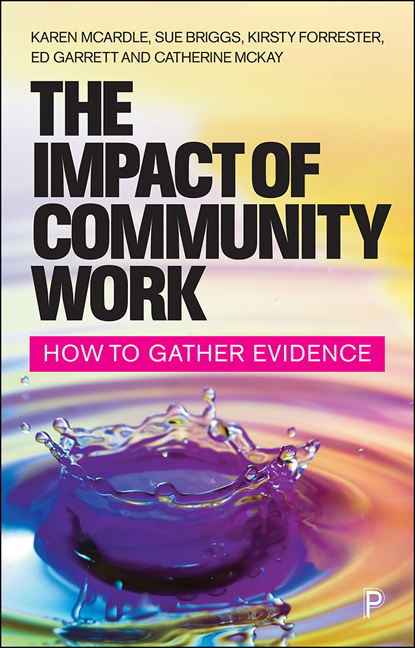4 - Presenting Findings to Different Audiences
Published online by Cambridge University Press: 10 March 2021
Summary
Introduction
You may be surprised to find that the first chapter in this part of the book is about presenting your findings. Usually, this topic appears at the end of a text, but we consider that presenting your findings is one of the first things you need to think about when expressing impact and when planning your project or services. There are particular complexities and challenges in working in community settings and it is not possible to simply undertake a project and then write it up with a quick evaluation, as the process is so much more complex and generating evidence needs careful planning from the very start. You will almost certainly also be generating multiple sources of evidence.
Increasingly, in times of austerity or rapid change, community work needs to present to decision makers and funders the effectiveness of what is funded and the impact of what is done. This is important to achieve sustainability of services; innovation in response to change; adaptation of services to meet new needs; and changes in service profile. It is also important for professional knowledge of the effectiveness of what we do – for self-evaluation. Finally, we have a responsibility to the communities with which we work, to share with them the impact of community work in order to celebrate successes and learn about what else can and needs to be done.
Presentation of findings can be done in many ways, too many to include all of them in this chapter, but we wish to encourage you to use your imagination and to find ways to include your participants in this process.
Planning your presentation
There are many approaches to planning a project, into which presentation must be built. One example is the Learning Evaluation and Planning (LEAP) framework, developed by the Scottish Community Development Centre, 2007. This method focuses on outcomes and partnership, and encourages practitioners to think about a series of questions that assist with planning and implementing their work. These questions focus on how you will achieve the difference you plan to make; how you will know you have made a difference; and how you can apply the lessons learned to future work. It links to the framework How Good is the Learning and Development in Our Community?
- Type
- Chapter
- Information
- The Impact of Community WorkHow to Gather Evidence, pp. 69 - 84Publisher: Bristol University PressPrint publication year: 2020

